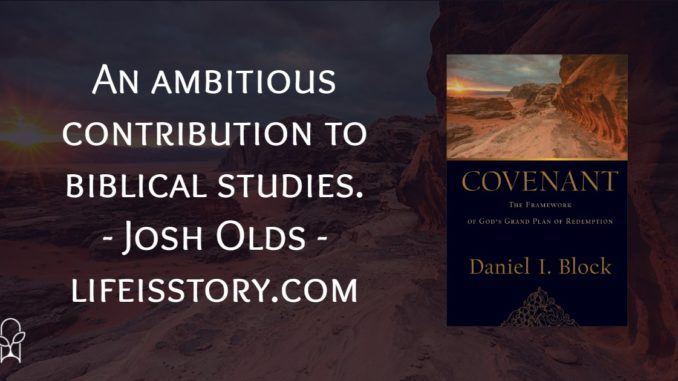
Published by Baker Academic on July 20, 2021
Genres: Academic, Non-Fiction, Theology
Buy on Amazon
Goodreads

Leading scholar Daniel Block helps students of the Bible understand the big picture of God's covenants with humanity as they play out in both the First and the New Testaments.
After fifty years of teaching and preaching around the globe, Block brings a lifetime of study and reflection on the First Testament and relationship with God to this comprehensive volume. The book focuses on God's covenants as the means by which God has reached out to a fallen humanity. It examines the heart and history of God's redemptive plan and shows why the covenants are essential for our understanding of the Bible.
Daniel I. Block is the Gunther H. Knoedler Professor Emeritus of Old Testament at Wheaton College. He has lectured and taught extensively on the Old Testament and covenant theology for many, many years. He’s written a number of influential Old Testament commentaries—Ezekiel for NICOT, Judges/Ruth for NAC, Deuteronomy for NIVAC, and Ruth for ZECOT, among others—and published a number of scholarly articles and monographs. Despite this legacy, Covenant: The Framework of God’s Grand Plan for Redemption stands as his most ambitious contribution to biblical studies.
While a scholarly work published by an academic press, Covenant keeps the tone and timbre of “advanced layperson” type of book—something a bit more academic than your average “pastor book” but not true academic writing. This is purposeful, as Block writes this book with here-I-stand mentality, not getting into academic debate or offering counterarguments and counter-counterarguments for every position raised in the book. In truth, this is as academic book written as if it was a popular-level book. That’s bound to frustrate critics, who will have a more difficult time in their critique as Block doesn’t do the work for them, but it does streamline the book in order to keep the narrative flow. And as Block is clear and purposeful about this, I see no problem with it. Block is writing Covenant as an end result of decades of study. He has “shown his work,” so to speak, in previous volumes and has no need to rehash it here.
Block divides human history into four parts: the cosmic and Adamic covenants, the Israelite covenant, the Davidic covenant, and the covenant in the New Testament. The majority of the book is spent on the latter, perhaps a peculiarity for an Old Testament scholar, but fitting for the scope of this book. About 250 pages is spent on the Israelite covenant, which is divided into four stages throughout Israelite history.
I appreciate that Block begins with the cosmic covenant. Creation—and covenant—extends further than just humankind. God’s promises are made not just to man as the imago Dei, but to the entire cosmos. Specifically, Block sees God’s covenant with Noah as being a larger covenant to the cosmos of which Noah is but the agent of the created order. He interprets the creation narrative as a relationship between the creator and the created. The Adamic covenant follows, but like before, Block interprets this through a move expansive lens, seeing Adam—literally, man—as representative of all humanity.
The Israelite covenant is discussed in detail, divided into four stages: 1) its origins with Abraham (Gen 15, 17); 2) its establishment at Sinai (Ex 19-Lev 27); 3) its renewal at the end of the exodus (Deut); and 4) its full realization in the future (Jer 31-33; Ezek 34, 36-37). Block also presents an excursus on the Levitical covenant, that, in my opinion, should have been expanded upon and placed in the body of the text. Block shows a command of the Old Testament that’s absolutely incredible and, even in areas where I would have quibbles of interpretation, Block’s views are presented clearly and concisely.
The Davidic covenant follows. While there’s much overlap with the Israelite covenant, the focus here is specifically on David’s kingship and the Messianic line that will come from him. That leads directly into the bulk of the book, which is a reflection on the New Testament through the lens of the “First Testament” (Block’s preferred term for the OT). This part of the book has exceptional value because it is not often that an Old Testament scholar forays into the New Testament at an academic level. Pastoral and personal, for sure, but academically is much rarer. Block doesn’t attempt to exegete the New Testament as a New Testament scholar but uses the paradigm of First Testament covenants to contextualize New Testament theology. Even if you don’t always agree, the perspective yields a fresh reading of the text that breaks down the artificial Old/New divide and sees God’s written revelation as continuous and progressive throughout the ages.
Covenant is a heady work, best read in sections with time between to ponder. Time will tell how it will be received academically, but for what it tries to accomplish, it accomplishes to perfection. It is a clear, thorough, understandable big-picture overview of how God’s promises to his creation have been fulfilled through history—all leading us to the reasonable conclusion that the unfilled promises will come to fruition in the future.
